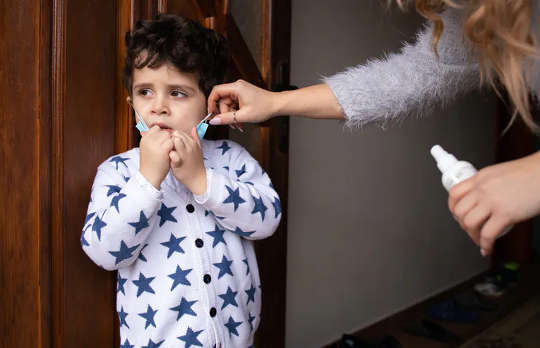
COVID-19 has led to global shut-downs which have rattled economies and families and will affect children for years to come. (Shutterstock)
Conversations are beginning about Generation C, the COVID-19 kids. While exactly which ages should be included in this generational label is under debate, what’s clear to researchers of child development is that COVID-19 has led to global shutdowns that have rattled economies, communities and families, and will affect children for years to come.
UNICEF reports the COVID-19 pandemic has upended the lives of children and their families around the world, and that across virtually every key measure of childhood, progress has gone backward. The number of children who are hungry, isolated, abused, anxious and living in poverty has increased. Children’s access to learning environments, socialization, essential services, health, nutrition and protection has decreased.
More and more, we will see the impact of social isolation, the loss social skill development and trauma on young children. Some children will bear the scars of the pandemic for years to come. Addressing those scars, especially for our more vulnerable and at-risk children, is an urgent priority. Access to high-quality early childhood education and kindergarten is not the singular solution to these problems, but is a cornerstone.
Invest now for lifelong gains
When children receive quality early childhood education — quality learning from birth to about age five — this pre-emptively lessens the need for later special education and lowers the intensity of support required.
Two years ago, colleagues and I demonstrated a correlation between the dominant benefits of early childhood education: boosted literacy/numeracy, language skills and social/behavioural regulation, especially for children with low socio-economic status. We published new research that identified 60 per cent of students enrolled in special education are there due to lags in these aforementioned areas.
This research inspired a special edition of Exceptionality Education International, which featured nine academic articles exploring the impact of early childhood education on special education.
The research was significant for ministries of education attempting to deal with growing special education budgets and abysmal outcomes for children enrolled in it. Today, in light of the pandemic, politicians, business leaders, educators and economists have a renewed interest and motivation to respond by advocating for and investing in the benefits of quality early childhood education.
Canada: Child-care strategy
In Canada, the impact of COVID-19 continues to reverberate. Mothers are bearing a disproportionate burden as the damage to their careers becomes a growing economic concern. An RBC report found that the employment rate for mothers has fallen to its lowest level in over three decades due to their loss of child care and the resultant need to become home teachers and child-care providers.
The COVID-19 economic crisis has exposed the fragility of the patchwork quilt of fractured child care. This month, Chrystia Freeland, deputy prime minister and finance minister, announced a Task Force on Women in the Economy to explore the impact of COVID-19 on women’s careers, including the need for a more stable child-care sector. The task force begins as the federal government’s Early Learning and Care Bilateral Agreements are about to expire, and negotiations with the provinces and territories for their renewal resume.
Canada’s upcoming federal budget is an opportunity to direct needed investments to quality early child care and education. Collectively, we have a chance to balance capacity with quality and create an informed national model of child care that meets families’ needs. Research on renewed economic arguments for quality early childhood education can help direct this.
Renewed economic arguments
My 2019 report cited studies in the United Kingdom identifying that quality early education can lower enrolment in special education between 40 to 55 per cent. A similar study in Ontario found that children without high-quality early education were three times more likely to require special supports for behaviour, one and a half times more likely to require language supports and twice as likely to require reading supports.
While these rates will not lead to a parallel reduction in special education budgets, due to the higher costs of students with more complex needs, the potential for savings is significant. This research is now receiving the attention of top economists in Canada.
 We have a chance to create quality national childcare. (Shutterstock)
We have a chance to create quality national childcare. (Shutterstock)
Importance of kindergarten
A recent economic report on Ontario’s two-year kindergarten program published by the Elementary Teachers’ Federation of Ontario discussed the impact of quality early childhood education on special education. Economists argued that early supports for child development through a strong two-year early learning program will save significant money by limiting special education enrolment and altering the trajectories of vulnerable and at-risk children.
A failure to alter the life trajectories of vulnerable and at-risk children is well researched in Canada. Research from The Conference Board of Canada presents a solid argument for the lost income, lower tax base and high draws on social programs across a life span for vulnerable children who don’t attain optimal education levels.
Reducing enrolment in special education means more students exit school with the marks, skills and confidence to pursue post-secondary education. I participated in research with economists with Deloitte who are expanding on this argument for investing in early childhood education with a particular look at the ability to lower special education costs. Deloitte explored significant budgets for special education in three provinces (Newfoundland, Nova Scotia and British Columbia) and identified an opportunity to reclaim millions of dollars that can be proactively reinvested in early child care and education.
International evidence
Internationally, evidence is mounting for this economic argument of reclaiming and redirecting special education budgets towards renewed investments in quality early childhood education. This doesn’t mean sudden cuts to special education, but rather investing in early years now to see improved outcomes for the most vulnerable children and eventual cost savings in special education.
A recent Australian study argued that without quality early learning we are spending significant money on ineffective late-stage interventions. Researchers posit that this failure to intervene at an early stage allows these initial learning needs to disrupt development and escalate.
While Canada reels from the effects of COVID-19, discussions on the critical importance of the early years and the entire Generation C are growing. The year 2021 is indeed a call to action. That action has to be informed as much by the recent experience of families in Canada as by the mounting economic evidence for wise, proactive fiscal investments.
About the Author
David Philpott, Professor, Special Education, Memorial University of Newfoundland
This article is republished from The Conversation under a Creative Commons license. Read the original article.
books_education
























